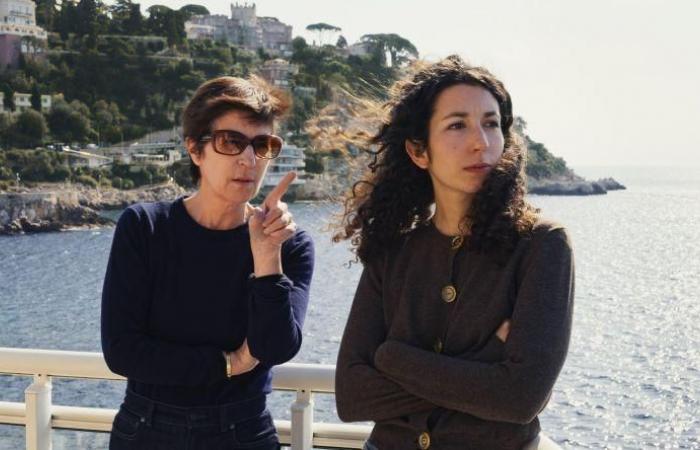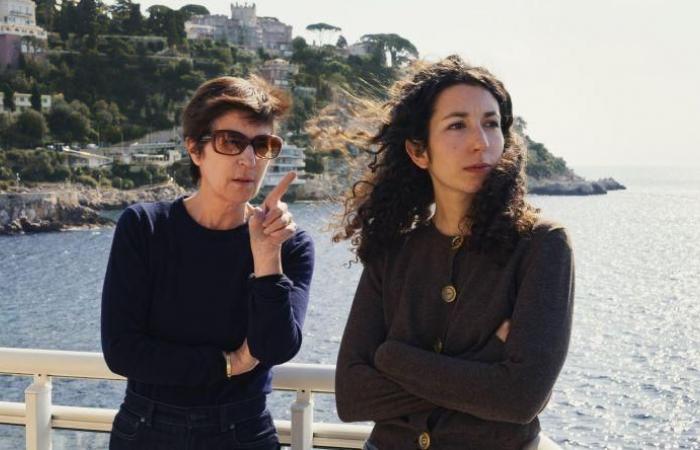Interview –
“A family”, the shocking documentary on incest by Christine Angot
Guest of the Visions du Réel festival for the Swiss release of her autobiographical documentary, the French author agreed to answer our questions.
Published today at 10:00 a.m.
Christine Angot and her daughter Léonore in the moving Une famille, her first documentary film.
© NOUR FILMS
Subscribe now and enjoy the audio playback feature.
BotTalk
- Christine Angot confronts family trauma in her documentary.
- The film explores the silence and unspoken surrounding incest.
- She hopes that society finally listens to victims of incest.
This article from April 11, 2024 was imported from Femina.ch and republished on our site on January 7, 2025.
After her powerful novels Incest, Impossible Love and Journey to the East, Christine Angot continues, camera in hand, to explore the traumas that haunt her. And today presents A Family – a documentary filmed in 2021 in which the author confronts the taboo, the unsaid and the deafening silence which envelops the horror suffered through family face-to-face encounters: the widow of her rapist father, her mother, her ex-partner, her daughter Léonore. Authentic encounters, under tension, hard, overwhelming, painful, violent and moving, too, which allow the veil to be lifted. To show how those around them cope with the suffering of a victim and disturbing truths.
Guest of the Visions du Réel festival for the Swiss release of this first film as striking as it is necessary since it “enters closed rooms on incest”, Christine Angot, who attends the screenings on April 14 and 15, 2024 in Nyon then in Gland , agreed to answer a few questions…
To testify, you, the recognized writer, have chosen to use images. Is it because it shows things that literature and writing cannot reproduce? Is it because she gives you “two looks”, as you explain to Claude, your ex-partner?
Literature can convey everything. Cinema too. But the collective dimension of cinema, and the fact that the filmed image is of the order of proof make it an art which can be political. We all see the same thing, together. And we can talk about it. Literature, we can’t. It’s more secret. That’s its beauty. Respect for silence.
The question of “two perspectives” applies to literature as well as to cinema. When I write or make a film, I have to have two perspectives. That of the person I am, and that of the person I become when I film or write. “I am another”, in other words.
In the field of art, we cannot speak of “testimony”. Testimony is a matter of social study and statistics.
We tend to think that certain subjects, particularly those concerning women or children, fall within the scope of testimony.
I testify neither in a film nor in a novel. On the other hand, I ensure that life, the things of life, which escape testimony, appear, and that the film is life itself.
As you enter your father’s widow’s house in Strasbourg, where hell began when you were 13, you say to the friends accompanying you, including the director Caroline Champetier: “I need you, come in …” You speak to them, of course, but to us who are also watching…
Of course. Initially, knowing that I was going to do a reading in a theater, I wanted it to be filmed. So, two people accompanied me, each with a camera, for in-camera and reverse-camera. They were two friends. They accompany me to my father’s neighborhood, they film, then I ring the bell, the door opens, and I tell them to follow me, so that you can come in too.
-This kind of scene always takes place behind closed doors, as if incest were a private, family, personal matter, and not a crime that affects society.
You also say: “I’m tired of talking about this, I’m tired of my work being invaded by this…” Has Turning A Family allowed you to lighten up – at least a little?
The question is not to lighten up, but to write, to film, to understand, to show, to find a literary or cinematographic language that allows us to see things as they are. It’s that simple. And also very complicated, it cannot be light. But it’s exciting.
At this point you will find additional external content. If you accept that cookies are placed by external providers and that personal data is thus transmitted to them, you must allow all cookies and display external content directly.
Allow cookiesMore info
The face-to-face encounter with your father’s wife is trying, violent, even… Today, thinking about it, how do you analyze her reactions?
They are those of someone who made a choice. Continuing to say that her husband was a wonderful person so as not to lose face, not to risk losing his social respectability, and not to take on the shame of incest. This is a common attitude, which forces the victim to carry this shame alone on their back.
Following this meeting, this woman as well as your half-brother and sister filed a complaint against you. Ultimate violence…
Yes, and also a classic system of reversal and inversion of violence. The shame of the accusation falls on the victim.
If your film clearly shows the horror of (dis)denied speech, it also brings hope that it is possible to listen – particularly when you dialogue with your daughter Léonore. Do you think that with the freedom of speech that is currently taking place, society will (finally!) start to really listen to victims of incest and sexual violence?
We will be able to listen to the victims from the moment we stop considering the richest, the most cultured, the most powerful as superior, and giving them all the powers. As long as it’s like this, there’s no reason for him to stop abusing it.
“The Tribune of Books”
The “Tribune de Genève” offers you shared readings, reviews, book news, reports and your favorites.
Other newsletters
Log in
Saskia Galitch has been a journalist since 1987. Currently at Femina and Le Matin Dimanche, she collaborates in the Society, Culture, Well-being and Health or Sciences sections.More info
Did you find an error? Please report it to us.
0 comments







